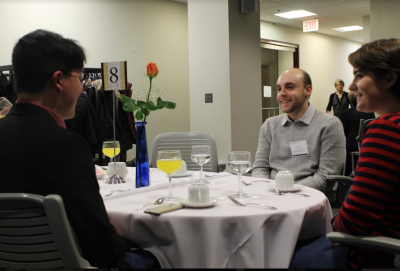 On Thursday, March 7th, the UConn Operations & Information Management (OPIM) Department held its third annual OPIM Alumni & Student Networking Dinner. The event, held at the UConn Graduate Business Learning Center, was attended by 12 alumni, 8 faculty, and 22 students, all with a background in management information systems (MIS), business data analytics (BDA), and/or business technology (BT). During the dinner, students table-hopped after each course of the meal (three in total) and networked with professionals from a variety of fields. The event was meant to promote professional development by placing students in an environment where they could network with UConn alums, receive advice, and develop valuable professional relationships.
On Thursday, March 7th, the UConn Operations & Information Management (OPIM) Department held its third annual OPIM Alumni & Student Networking Dinner. The event, held at the UConn Graduate Business Learning Center, was attended by 12 alumni, 8 faculty, and 22 students, all with a background in management information systems (MIS), business data analytics (BDA), and/or business technology (BT). During the dinner, students table-hopped after each course of the meal (three in total) and networked with professionals from a variety of fields. The event was meant to promote professional development by placing students in an environment where they could network with UConn alums, receive advice, and develop valuable professional relationships.
As a senior MIS student, myself, attending the networking dinner gave me insight as to how altruistic UConn MIS, BDA, and BT alumni are. Many of the students who attended the dinner were underclassmen, but their initial anxieties and insecurities regarding networking were assuaged by the encouragement of the professionals around them. Many UConn alumni who have graduated with an OPIM background now have full-time positions at companies like Travelers and Cigna, yet they spoke to students as if they were reliving their own undergraduate experiences. Alumni like giving back because they have been in our shoes, before, a theme that was recurrent throughout the event. “I like informing students of the different opportunities available at the company I work for and informing students of the different career paths they can take as an MIS major,” said Anuj Desai, a Performance Data Engineering Scrum Master at Cigna. “As an MIS student, I didn’t really know what the corporate organization looked like, so it’s always good to have events like these.”
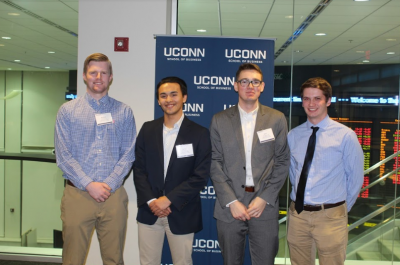 As for the perspective of current students, many MIS majors who attended the dinner left with a greater understanding of the information technology industry, the skills desired by certain companies, and interview advice. “The event really helped with my networking skills,” said Andrew Taylor (MIS ’21), a statement that resonated with many of the other students I spoke with. “They gave me a lot of insightful information on what companies are looking for in someone who has an MIS background,” added Andrew Eastman (MIS ’20). “A lot of the people I talked to were like, ‘Yes, this is the super hot thing! This is the skill to know right now!'”
As for the perspective of current students, many MIS majors who attended the dinner left with a greater understanding of the information technology industry, the skills desired by certain companies, and interview advice. “The event really helped with my networking skills,” said Andrew Taylor (MIS ’21), a statement that resonated with many of the other students I spoke with. “They gave me a lot of insightful information on what companies are looking for in someone who has an MIS background,” added Andrew Eastman (MIS ’20). “A lot of the people I talked to were like, ‘Yes, this is the super hot thing! This is the skill to know right now!'”
During the networking dinner, Jonathan Moore, the MIS Program Director of the OPIM Department, thanked attending alumni for their continued contribution to the MIS major. As adjunct professors, mentors, and points of contact for current MIS students, we appreciate you! Thank you for coming to the dinner! We hope to see you again, next year!

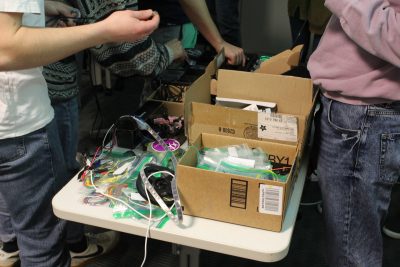 On Friday, March 1st, OPIM Innovate hosted its Wearable Tech in Action workshop from 1:00 PM to 3:00 PM in the Gladstein Lab. There, students were able to use hardware such as FLORA microcontrollers, UV light sensors, and force sensors to design their own wearable technologies with pre-coded software templates created using Arduino, an open-source electronic prototyping software. There were multiple projects students could choose from based on the parts they selected from the toolkit supplied by the event instructor. Encouraged to work on their own, students downloaded the Arduino software, began building their wearable technologies, and experimented with changing light colors and cycle times by altering the code provided to them on the workshop’s
On Friday, March 1st, OPIM Innovate hosted its Wearable Tech in Action workshop from 1:00 PM to 3:00 PM in the Gladstein Lab. There, students were able to use hardware such as FLORA microcontrollers, UV light sensors, and force sensors to design their own wearable technologies with pre-coded software templates created using Arduino, an open-source electronic prototyping software. There were multiple projects students could choose from based on the parts they selected from the toolkit supplied by the event instructor. Encouraged to work on their own, students downloaded the Arduino software, began building their wearable technologies, and experimented with changing light colors and cycle times by altering the code provided to them on the workshop’s 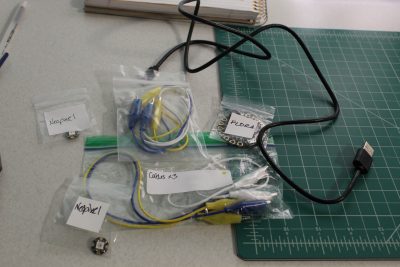 Since this was the first time I had ever created a wearable piece of technology, I decided to build an accessory that utilized a FLORA microcontroller and a neopixel light. Thanks to the diagrams available to us when using the GitHub tutorials, it was not that difficult to put together. In all, it took one micro USB cord connected to my laptop to power the FLORA microcontroller and upload the Arduino code. From there, I had to use three alligator clips and three on-board pads, or points of contact between devices, on both the FLORA microcontroller and the neopixel light to individuate the electric pulses that would make the device work properly given the current code. Once everything was connected, the neopixel light began to cycle through different colors. At first, the device ran on a red, green, and blue cycle. Then I changed the colors to aqua blue, purple, and pastel pink.
Since this was the first time I had ever created a wearable piece of technology, I decided to build an accessory that utilized a FLORA microcontroller and a neopixel light. Thanks to the diagrams available to us when using the GitHub tutorials, it was not that difficult to put together. In all, it took one micro USB cord connected to my laptop to power the FLORA microcontroller and upload the Arduino code. From there, I had to use three alligator clips and three on-board pads, or points of contact between devices, on both the FLORA microcontroller and the neopixel light to individuate the electric pulses that would make the device work properly given the current code. Once everything was connected, the neopixel light began to cycle through different colors. At first, the device ran on a red, green, and blue cycle. Then I changed the colors to aqua blue, purple, and pastel pink.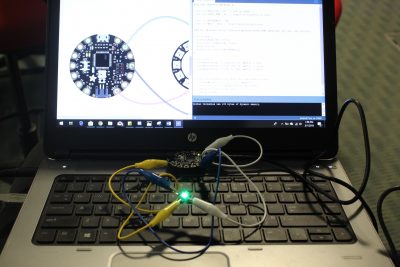 As I continued to experiment with my wearable accessory, I found that you could do various things with the code. For one, you could decrease the brightness of the lights, or even add an extra color to the current hue loop. Looking around me, I also saw my peers use Arduino to create color waves utilizing the neopixel strip, which carries 60 individual neopixels inside of it. Light traveled up and down the strip in a single color, something that could have become a rainbow arrangement with a little extra time.
As I continued to experiment with my wearable accessory, I found that you could do various things with the code. For one, you could decrease the brightness of the lights, or even add an extra color to the current hue loop. Looking around me, I also saw my peers use Arduino to create color waves utilizing the neopixel strip, which carries 60 individual neopixels inside of it. Light traveled up and down the strip in a single color, something that could have become a rainbow arrangement with a little extra time.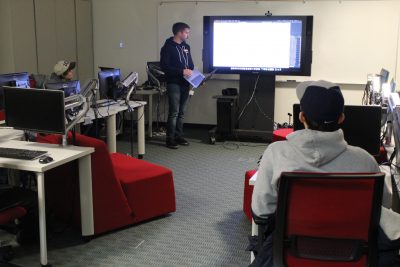 On Friday, February 22nd, OPIM Innovate hosted its Splunk Analytics Workshop. There, Professor
On Friday, February 22nd, OPIM Innovate hosted its Splunk Analytics Workshop. There, Professor 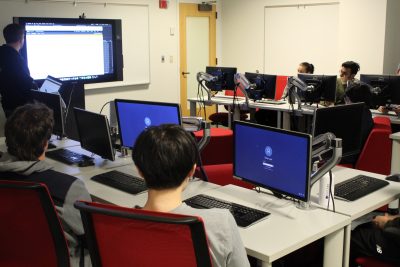 Splunk is a very flexible service that allows users to integrate data from other software such as SQL Developer, a database client. “Databases are everywhere and important,” O’Connor explained to students, “but, some database clients don’t visualize data well. They just store it, keep its structure, and that’s it.” That is why O’Connor developed an application, called DB Connect, that can grab database information, make a copy of the data inside of Splunk, and then visualize it. “It can make pie charts, line charts, or whatever the case may be,” said O’Connor. “Splunk isn’t designed to replace any one of these [database clients], but instead to aggregate data from them.” Splunk can also capture real-time web data, such as the number of times a server is pinged by a computer or the number of times it is successfully infiltrated.
Splunk is a very flexible service that allows users to integrate data from other software such as SQL Developer, a database client. “Databases are everywhere and important,” O’Connor explained to students, “but, some database clients don’t visualize data well. They just store it, keep its structure, and that’s it.” That is why O’Connor developed an application, called DB Connect, that can grab database information, make a copy of the data inside of Splunk, and then visualize it. “It can make pie charts, line charts, or whatever the case may be,” said O’Connor. “Splunk isn’t designed to replace any one of these [database clients], but instead to aggregate data from them.” Splunk can also capture real-time web data, such as the number of times a server is pinged by a computer or the number of times it is successfully infiltrated. Originally from Neshanic Station, New Jersey, junior management information systems major
Originally from Neshanic Station, New Jersey, junior management information systems major 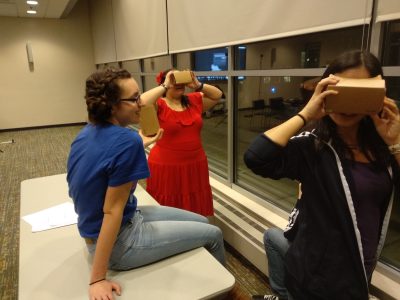 On Friday, February 22nd, OPIM Innovate co-hosted the Totally Teched Out Late Night Event in collaboration with UConn Late Night. In the Student Union, Room 104, a number of students from different academic backgrounds interacted with emerging technologies such as virtual reality headsets and leading software like Splunk Enterprise and HP Reveal. While many students walked in without prior knowledge of OPIM Innovate, they left with a piqued interest regarding what the initiative has to offer.
On Friday, February 22nd, OPIM Innovate co-hosted the Totally Teched Out Late Night Event in collaboration with UConn Late Night. In the Student Union, Room 104, a number of students from different academic backgrounds interacted with emerging technologies such as virtual reality headsets and leading software like Splunk Enterprise and HP Reveal. While many students walked in without prior knowledge of OPIM Innovate, they left with a piqued interest regarding what the initiative has to offer.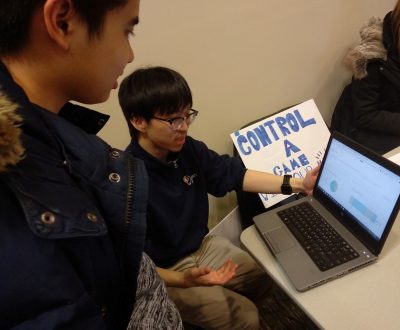 For some students, the Innovate Room at the Totally Teched Out Late Night Event was the first time they had ever encountered some emerging technologies or software. Xiaofeng Gong (’20 Mathematics and Economics), for example, had never heard of Splunk Enterprise before being introduced to the software by Nathan Hom. “A
For some students, the Innovate Room at the Totally Teched Out Late Night Event was the first time they had ever encountered some emerging technologies or software. Xiaofeng Gong (’20 Mathematics and Economics), for example, had never heard of Splunk Enterprise before being introduced to the software by Nathan Hom. “A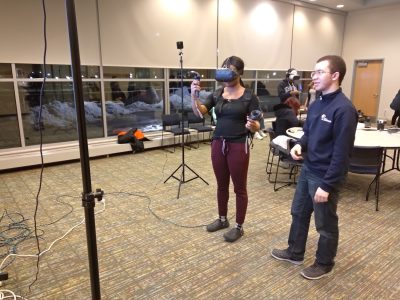 For the students running the Innovate Room, the hustle and bustle was worth every minute of getting to see interest emerge in another student’s face.
For the students running the Innovate Room, the hustle and bustle was worth every minute of getting to see interest emerge in another student’s face.